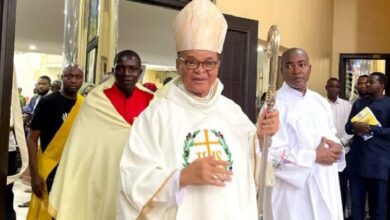Galamsey destroys fertile lands
The high price of gold in recent years has led to increase in illegal mining (Galamsey) and the influx of foreigners to this sector in Ghana.
From a meagre price of $349 an ounce in 2001, the price is hovering between $1,100 and $1,300 per ounce today.
Though Ghana is Africa’s second-highest producer of Gold besides South Africa, “only 16 per cent of Ghana’s tax revenues come from mining”.
These were contained in an article titled Illegal Gold Mining in Ghana undercuts Church’s Plan for Land by Melanie Lidman, Middle East and Africa Correspondent for Global Sisters Report (GSR) based in Israel, copied to The Catholic Standard.
The Global Sisters, who are committed Agents of change, engage the world on how Religious Women try to change the world through Gospel values
Dilating on illegal mining activities at Hia, a village in the Obuasi Diocese, the Article indicated that these activities had wreaked havoc on the environment and created a lot of health hazards.
According to the article, the Anglogold Ashanti in November 2015, laid off more than 5,000 workers which it described “as a devastating blow to Obuasi, whose entire economy depended on the mine”.
In view of this, when foreign investors arrived at Obuasi, they have a willing pool of desperate people but with the knowledge of mining willing to be employed in the illegal mining.
With the layoffs, the Report added, Obuasi with about 180,000 people struggles to put food on their table”.
It quoted the United Nations International Development Organization (UNIDO) as saying that small-scale mining like the type at Hia, “is responsible for 37 per cent of mercury emission in the world, “creating cancer and birth defects.
Because of the quick money people make in illegal mining, it also creates social problems, like teenage pregnancy, school drop-outs and prostitution.
The article stated that under such circumstances, families “fall apart” while indiscipline reigns high”, noting that since the world “is hungry for gold, such activities would continue in Ghana”.
The article quoted Most Rev. John Yaw Afoakwah, Bishop of Obuasi Diocese as lamenting that miners had been taking money away from the mining areas without any development.
The Hia mining land belongs to the Catholic Church at Obuasi
The Bishop therefore stressed the need to provide social amenities in these areas for the inhabitants to live a better life.
According to the Bishop as captured in the article, the problem of illegal mining “stems from the way poverty forces people to operate in a survival mode, concentrating on making sure there is enough food today without thinking about the future generations”.
Madam Lidman noted that the people she spoke to believed that since the government had a difficult challenge in controlling the illegal mining, Church Leaders could play a unique role in this direction.
The article urged Religious Leaders to use the pulpits to sensitize the people on the dangers of illegal mining.
It pointed out that “in Ghana, whenever the Catholic Bishops’ Conference speaks, everybody listens, even the government,” urging it (the Conference) to continue harping on the problems created by illegal mining.
